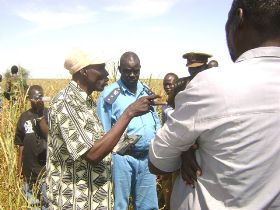Jonglei’s Bor Commissioner tours forest for farms
By Philip Thon Aleu
July 18, 2009 (BOR TOWN) — The newly appointed Commissioner of Bor County, Jonglei State says he is determined to control food shortage and tribal fighting by opening large farms in area shared by many Counties.

Aja-ger is a Bor County’s located at 40 Kilometers east of Bor Town.
Mr. Maker, flanked by state members of parliament – Philip Thon Nyok, Ezra Mayom Ngong and Alier Agot, toured Aja-ger to access water supplies for deployment of prison and wildlife forces there. Maker wants the County security service men relocated to Aja-ger.
Abraham Rech of the wildlife and Deng Leek from the prison forces as well as a group of journalists accompanied the Commissioner for a day visit.
Commissioner Maker, who took office from Abraham Jok Ariing two weeks ago, told reporters following the visit to Aja-ger that prison and wildlife forces will be deployed and farms open. Water points should be increased there, he said.
A vast open land with dotted trees all over and a semi desert, Aja-ger is shared by Bor, Pibor, Twic East, Duk and Uror Counties in Jonglei State. However, depending on the local community, naming this western empty land from Pibor, eastern of Twic East, southern Duk and Uror and eastern Bor County, may vary.
In this particular territory, the soil is hallowed and large-leaved grasses grow here. Wild animals and cattle rustlers or traders on rare bases, enjoy this enormous land. The last settlers from Bor, according to historians, deserted Aja-ger in 1950 due to lack of water. Between the years 2005-6, Catholic Relief Services (CRS) constructed 2 boreholes there. Anticipating surging settlement from his policies, Bor Commissioner says more will be drilled to address uncertainties and help in farming.
“We want to make this area (Aja-ger) as a peaceful buffer zone. If we turn it into cultivating area, people will be engaged in farming [rather] than cattle rustling,” Commissioner Maker said. The commissioner, who is a trained agriculturalist, estimated the would-be farm land at three millions hectors.
On long term plans, he says, “we want to orient the people” by new policy.
On education, the commissioner calls for a “change to quality education” since there are many schools and thousands of children enrolled each year.
“We must motivate the teachers by paying little money. But this need sensitization from the media, members of parliament and the entire community,” he said.
A primary teacher is paid 300 Sudanese pounds (about $120 U.S) a month. On average, ten teachers teach in one primary school irrespective of the enrollment. For instance, Bor “A” and “B” primary schools have more than 1,500 pupils each but only ten or less teachers are paid by the government. Though children pay registration fees, there is no legislated tuition fees payment.
(ST)
